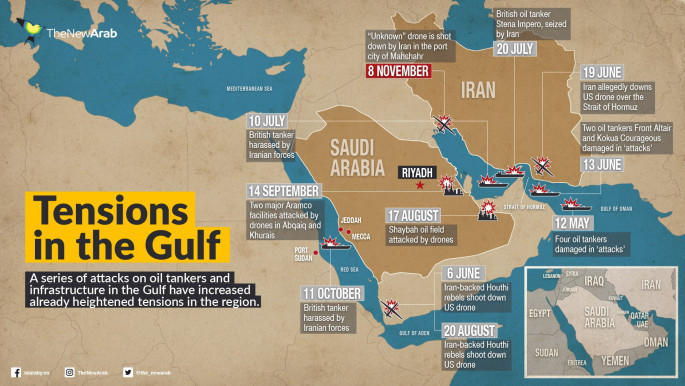Aramco deploying Saudi-made drones to protect facilities as oil-giant prepares IPO launch
State-owned oil giant Saudi Aramco will use advanced war drones made in the kingdom to protect its facilities.
3 min read
Saudi Aramco's oil plants were hit by drone attacks in September [AFP/Getty]
Saudi Aramco will protect its oil refinery facilities in the kingdom with a fleet of Saudi-made war drones, an official at Saudi-based Advanced Electronics Company has revealed.
Aramco facilities were hit earlier this year by drone and missile strikes, exposing their vulnerability as the state-owned energy giant prepares to launch its much-anticipated initial public offering (IPO).
The official, who recently began working with state-owned defence company Saudi Arabian Military Industries told Russian news agency Novosti that Aramco intends to purchase a number of "Bakir" drones to ensure the security of its oil facilities.
The drone has not yet been revealed to the public, the official said, and is capable of travelling over 4.5 kilometres when not fully loaded.
S&P Global Ratings said the stock market debut could enable the kingdom to strengthen its financial position.
Critics, however, have cast doubt over the profitability of the company amid security risks in the region and rising concerns over the long-term use of carbon-based fuels due to climate change.
The official, who recently began working with state-owned defence company Saudi Arabian Military Industries told Russian news agency Novosti that Aramco intends to purchase a number of "Bakir" drones to ensure the security of its oil facilities.
The drone has not yet been revealed to the public, the official said, and is capable of travelling over 4.5 kilometres when not fully loaded.
The official said his company had received orders for the unmanned aerial vehicles from the Saudi Air Force and Aramco, and that Advanced Electronics is currently working to adapt the drones to suit their needs.
Aramco, the world's largest oil producer, said it would sell 1.5 percent of the company in an initial public offering (IPO) worth $24 to $25.6 billion, scaling down the kingdom's initial plan to sell up to five percent of the firm.
Saudia Arabia on Sunday valued state-owned energy giant Aramco at up to $1.71 trillion, missing Crown Prince Mohammed bin Salman's initial target of $2 trillion in what was expected to be the world's biggest IPO.
But the state's control of the company poses multiple risks to investors, as highlighted by the attacks on two key Aramco processing sites in September, which Saudi Arabia and the United States blamed on their mutual foe Iran.
But the state's control of the company poses multiple risks to investors, as highlighted by the attacks on two key Aramco processing sites in September, which Saudi Arabia and the United States blamed on their mutual foe Iran.
Aramco, the world's largest oil producer, said it would sell 1.5 percent of the company in an initial public offering (IPO) worth $24 to $25.6 billion, scaling down the kingdom's initial plan to sell up to five percent of the firm.
Read more: Unanswered questions over Aramco IPO could undermine Saudi crown prince's vision
The success of Crown Prince Mohammad bin Salman's Vision 2030 is tied to that of the Aramco IPO, with billions of dollars expected to be generated from the offering to be funnelled into controversial mega projects across the kingdom.S&P Global Ratings said the stock market debut could enable the kingdom to strengthen its financial position.
Critics, however, have cast doubt over the profitability of the company amid security risks in the region and rising concerns over the long-term use of carbon-based fuels due to climate change.
 |
The plan to sell part of the company is crucial to the crown prince's plans for a wider economic overhaul aimed at raising new streams of revenue for the oil-dependent country, with oil prices currently struggling to reach the price range per barrel analysts say is necessary for Saudi Arabia to balance its budget.
Bin Salman has said listing Aramco is one way for the kingdom to raise capital for the country's sovereign wealth fund, which would then be used to finance mega projects across Saudi Arabia as part of the crown prince's Vision 2030.





 Follow the Middle East's top stories in English at The New Arab on Google News
Follow the Middle East's top stories in English at The New Arab on Google News
![The UAE is widely suspected of arming the RSF militia [Getty]](/sites/default/files/styles/image_330x185/public/2024-11/GettyImages-472529908.jpg?h=69f2b9d0&itok=Yauw3YTG)
![Netanyahu furiously denounced the ICC [Getty]](/sites/default/files/styles/image_330x185/public/2024-11/GettyImages-2169352575.jpg?h=199d8c1f&itok=-vRiruf5)
![Both Hamas and the Palestinian Authority welcomed the ICC arrest warrants [Getty]](/sites/default/files/styles/image_330x185/public/2024-11/GettyImages-2178351173.jpg?h=199d8c1f&itok=TV858iVg)